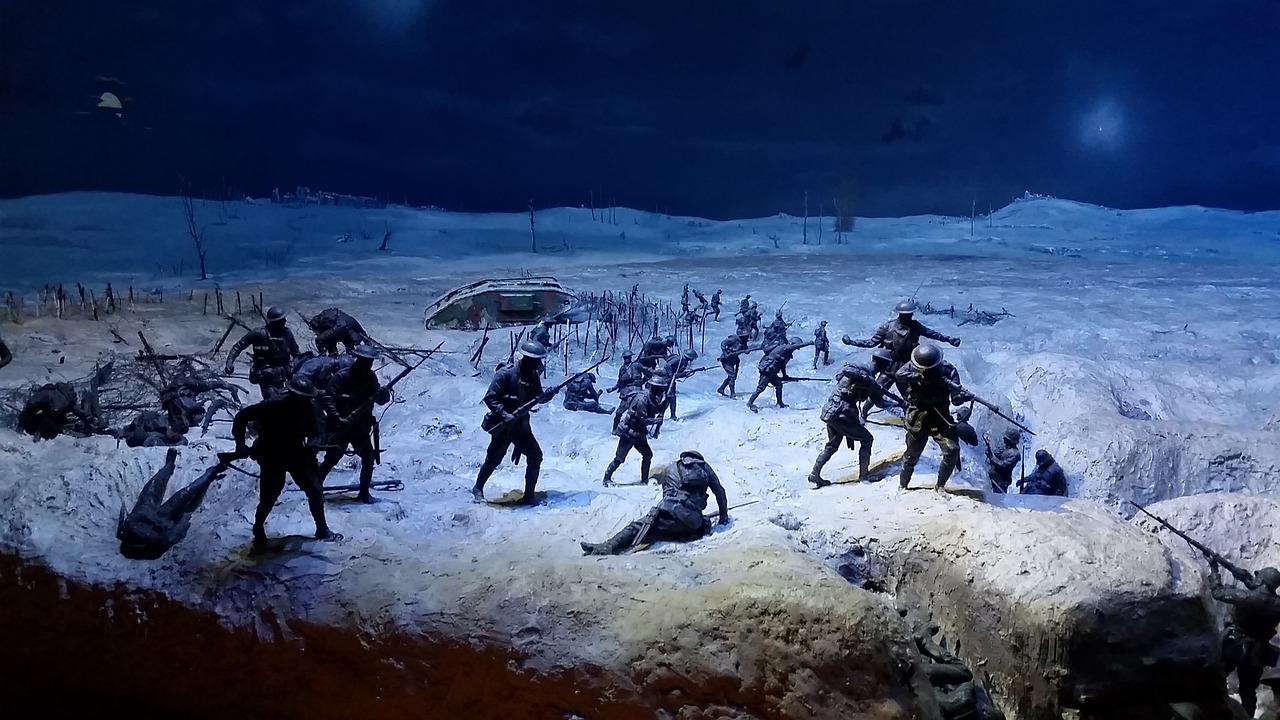Holy Nightনমুনা

A Truly Silent Night
The Germans started it...
The Great War, the War to End all Wars (now known to us as World War I), had been raging for five months in late 1914. On one side were Germany, Austria-Hungary, the Ottoman Empire, and others. On the other was France, England, Russia, and later, the United States and others. Neither side had made much headway in defeating the other. A 500-mile stretch of territory that ran through Flanders (Belgium, France, and the Netherlands) was called the Western Front.
Early in December of that year, Pope Benedict XV made a public plea to both factions in the war. He asked, “that the guns may fall silent at least upon the night the angels sang.” However, commanding officers on both sides ignored the Pope’s request and were determined to fight on – Christmas or not.
Nevertheless, on Christmas Eve, 1914, German soldiers in the trenches caught the holiday spirit. They lit candles and hung them from evergreen trees. They hoisted banners that read, “We not shoot, you not shoot.” Not knowing what to think, the British soldiers held their positions. Finally, a German soldier dared venture into “no man’s land,” the field that separated the two battle trenches. A single voice began to sing:
Stille Nacht. Heilige Nacht.
Alles Schlaft, einsam wacht
(Silent Night, Holy Night
All is calm, all is bright.)
British soldiers answered with antiphonal greetings. Before too long, more soldiers on either side left their trenches and began presenting small gifts to each other and exchanging handshakes. One British soldier wrote: “I wouldn’t have missed that unique and weird Christmas Day for anything… I spotted a German officer, some sort of lieutenant I should think, and being a bit of a collector, I intimated to him that I had taken a fancy to some of his buttons… I brought out my wire clippers and, with a few deft snips, removed a couple of his buttons and put them in my pocket. I then gave him two of mine in exchange….”
News spread down the lines. From Christmas Day until well into the New Year, regiments along the battle lines joined in with similar gestures of goodwill, much to the chagrin of their commanders. (One notable dissenter was a young corporal named Adolf Hitler.)
Referring to that short unofficial ceasefire, another soldier reported, “I remember the silence, the eerie sound of silence. Only the guards were on duty. We all went outside the farm buildings and just stood listening. And, of course, thinking of people back home. All I’d heard for two months in the trenches was the hissing, cracking, and whining of bullets in flight, machinegun fire, and distant German voices. But there was a dead silence that morning, right across the land as far as you could see. We shouted ‘Merry Christmas’, even though nobody felt merry. The silence ended early in the afternoon and the killing started again. It was a short peace in a terrible war.”
This Christmas war story brings heartwarming and inspiring sentiments. One coming from a passion for freedom; another coming from a yearning for peace. But the Prince of Peace, Jesus, had already come to wage His own war against sin and the despair that has been around since Eden. The peace He gives, however, is not the absence of conflict but the serenity of spirit that the Apostle Paul describes as “the peace that passes human understanding.”
Today our world is full of conflict and oppression without any external sign or hope of relief. This makes knowing the Prince of Peace even more beautiful.
Jesus spoke of freedom in John 8: 31-32:
‘Very truly I tell you, everyone who sins is a slave to sin. Now a slave has no permanent place in the family, but a son belongs to it forever. So if the Son sets you free, you will be free indeed.’”
Regarding peace, Jesus told His disciples,
“Peace I leave with you. My peace I give to you; not as the world gives do I give to you. Let not your heart be troubled, neither let it be afraid” (John 14:27).

About this Plan

Christmas has become quite the event in this country--much of it having nothing to do with the Savior whose birth we celebrate. Here are some short readings that may help us all get back to the "Reason for the Season."
More
Related Plans

Acts 9:1-19 | God Can Save Anyone. Anyone!

Your Story Has a Villain by Jonathan Pokluda

NT100: The New Testament in 100 Days

Hebrews

Gone Fishin' Seven

Seven Names of God in Hebrew: Discovering His Character

The Courage to Speak: A Journey in the Book of Esther

Forgiveness Is...

Being the Church Beyond Sunday
